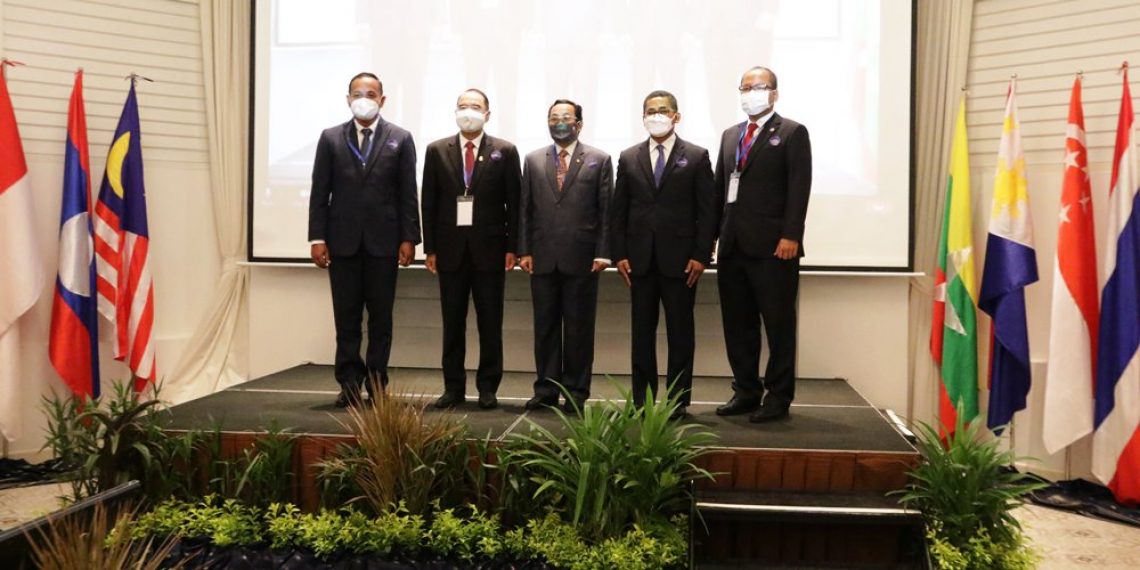PHNOM PENH, 7 July 2021 — Representatives and senior officials of national mine action authorities, donor agencies and parties, convened in the ‘’Achieving Sustainable and Inclusive Development in Landmine/Explosive Remnant of War (ERW)-Affected Countries’’ workshop and promise to synergise efforts in mine action and develop a set of recommendations and strategies that link Sustainable Development Goals (SDGs) targets in their national and regional level priorities.
The ASEAN Regional Mine Action Center (ARMAC) and the Indonesian Embassy in Phnom Penh organised the workshop on 1 July in Siem Reap, Cambodia, among a series of ARMAC’s regional events planned this year to promote dialogue and strengthen cooperation in the mine action sector at the regional level.
The workshop brought together stakeholders from ASEAN landmine/ERW affected countries and non-affected states, partners and stakeholders in the region.
In his opening statement, the Indonesian Ambassador to Cambodia Sudirman Haseng highlighted Indonesia’s commitment and active engagement with humanitarian mining activities in the region.
He also stressed that Indonesia’s commitment is mainly channeled through ARMAC and the ASEAN Defence Ministers’ Meeting Plus Experts’ Working Group on Humanitarian Mine Action. “This workshop is to fulfil Indonesia’s commitment to support ARMAC, in particular its work relating to enhancing awareness programme on the dangers of mine/ERWs,” he added.
Director-General of ASEAN Cooperation of the Indonesian Ministry of Foreign Affairs Sidharto R. Suryodipuro emphasised the three key points relevant to the workshop: the importance of a comprehensive and holistic approach to address the threat of landmines and ERW should not be limited to security and humanitarian aspect. It also must take into account the development aspect, landmine clearance operations, and victims’ rehabilitation and continuous international collaboration such as the ASEAN cooperation mechanism where partners and donor countries extend support.
On his part, Undersecretary of State of the Cambodian Ministry of Foreign Affairs and International Cooperation Norng Sakal underscored the need for promoting regional cooperation in mine action. “The collective partnership platform will be used as a tool to enhance cooperation among ASEAN community and beyond to link mine action to national and regional development,” he stated.
Senior Minister and First Vice President of the Cambodian Mine Action and Victim Assistance Authority Ly Thuch called for countries to lay down roadmaps in synergising efforts to create peace and sustainable development that aligns with the 2030 Agenda’s goal at the national and local levels.
He reiterated that the Cambodian Government has adopted all 17 universal SDGs and added a localised SDG 18 to specifically address the issue of landmine/ERW. He further encouraged everyone to work together to achieve the common goal of sustainable and inclusive development in landmines/ERW-affected countries.
In conclusion, Ly Thuch noted that a robust financing strategy would be key to the successful implementation of the 2030 Agenda and looked forward to seeing the results of the workshop discussions translated into meaningful actions at the country and regional levels .
- ABOUT ASEANThe Association of Southeast Asian Nations, or ASEAN, was established on 8 August 1967 in Bangkok, Thailand, with the signing of the ASEAN Declaration (Bangkok Declaration) by the Founding Fathers of ASEAN: Indonesia, Malaysia, Philippines, Singapore and Thailand. Brunei Darussalam joined ASEAN on 7 January 1984, followed by Viet Nam on 28 July 1995, Lao PDR and Myanmar on 23 July 1997, and Cambodia on 30 April 1999, making up what is today the ten Member States of ASEAN.Menu
- WHAT WE DO
ASEAN organs always strive to achieve ASEAN’s goals and objectives, the Secretary-General of ASEAN and the ASEAN Secretariat shall be functioned as coordinating Secretariat to help facilitate effective decision-making withing and amongst ASEAN bodies. In addition, each Member State shall appoint a Permanent Representative to liaise with Secretary-General of ASEAN and the ASEAN Secretariat
Menu - WHO WE WORK WITH
ASEAN shall develop friendly relations and mutually beneficial dialogues, cooperation and partnerships with countries and sub-regional, regional and international organisations and institutions. This includes external partners, ASEAN entities, human rights bodies, non-ASEAN Member States Ambassadors to ASEAN, ASEAN committees in third countries and international organisations, as well as international / regional organisations.
Menu - OUR COMMUNITIES
The rodmap for an ASEAN Community (2009-2015) was declared by the leaders in 2009. The ASEAN Community, anchored on three community pillars: Political-Security Community, Economic Community, Socio-Cultural Community was launched in 2015. The ASEAN 2025: Forging Ahead Together was introduced in 2015 as a Post-2015 Vision. It comprises the ASEAN Community Vision 2025, the ASEAN Political-Security Community Blueprint 2025, the ASEAN Economic Community Blueprint 2025 and the ASEAN Socio-Cultural Community Blueprint 2025
Menu - SITEMAP





